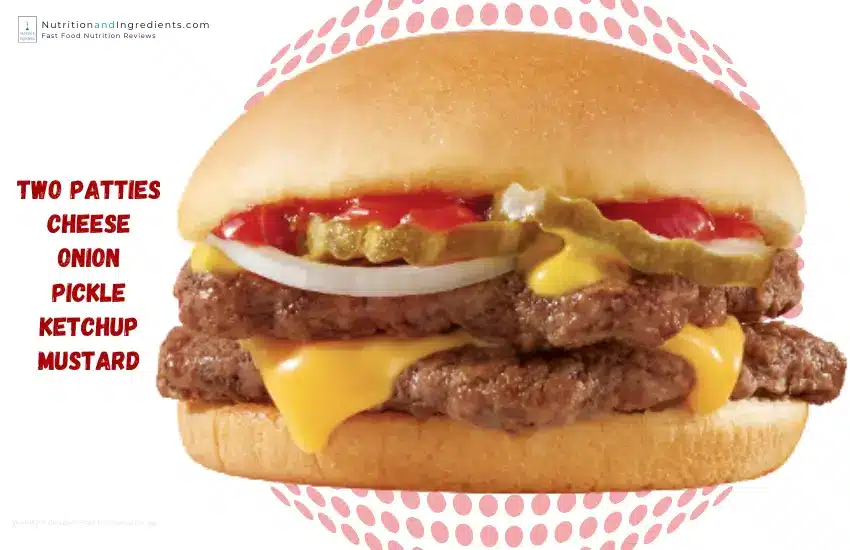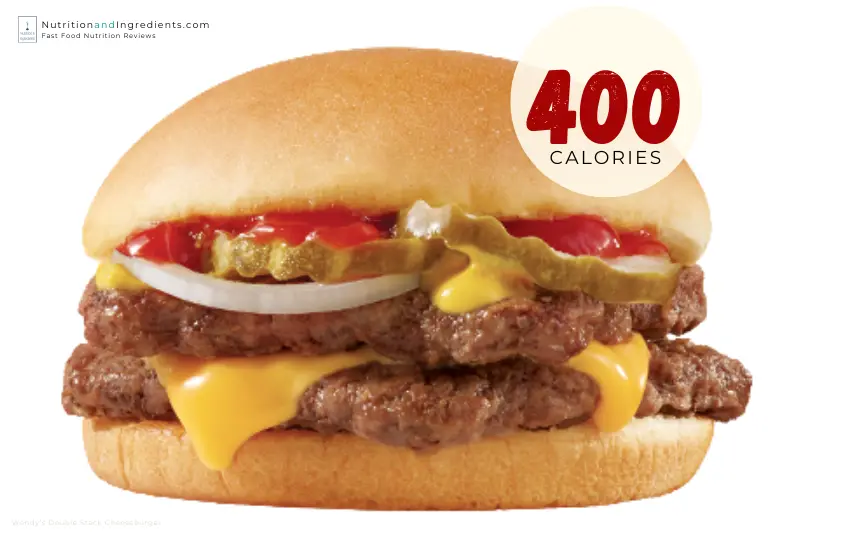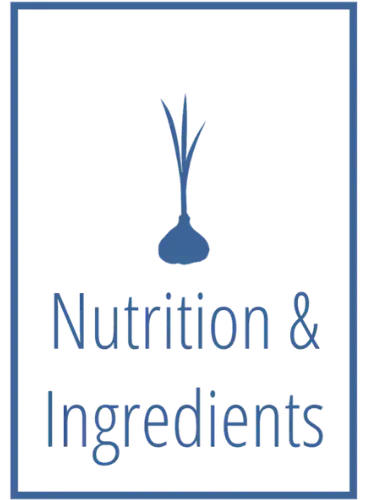Wendy’s Double Stack Cheeseburger

The Double Stack Cheeseburger at Wendy’s is made with two fresh beef patties and melted cheese. It’s served with pickles, onions, ketchup and mustard.
There are 410 calories, 24 grams fat, 26 grams carbohydrates, and 23 grams protein in Wendy’s double patty cheeseburger.
Read this fast food report for a complete review of the nutrition facts, calories, ingredients, and allergens in the double patty cheeseburger from Wendy’s.
Cheeseburger Nutritional Information
Nutrition facts are based on standard formulations for one double patty cheeseburger.
Daily Value
Daily value (%DV) is based on general nutrition guidance set by the FDA for American adults who follow a daily diet of 2,000 calories. It measures the amount of a specific nutrient per serving, relative to the suggested limit.
As shown in the chart below, Wendy’s Double Stack is high in saturated fat, sodium, and dietary cholesterol.
Serving size: 1 Burger
% DAILY VALUE
Use %DV to determine if the level of nutrients in a food is low (5% or less) or high (20% or more).
|
%DV |
Level | |
|---|---|---|
|
Saturated Fat |
50% |
HIGH |
|
Sodium |
33% |
HIGH |
|
Cholesterol |
20% |
HIGH |
%DV based on 2,000 calories
Calories
There are 400 calories in a Wendy’s Double Stack Cheeseburger.
Here is a summary of calories by macronutrient, per serving:
More than half of the total calories are derived from 23 grams of dietary fats. Carbohydrates make up about one quarter of the total calories and the remaining 22% is from protein.
Double Stack Cheeseburger
% calories from fat, carbs and proteinSummary of calories breakout by nutrient above is a rounded estimate based on the nutrition facts provided by Wendy’s fast food restaurant. Calories may vary as a result of how the burger is prepared onsite.
FITNESS TIME TO BURN 400 CALORIES
Estimate based on moderate level of activity by an adult with average BMI.
Review the chart below for the nutrition facts in Wendy’s Double Stack cheeseburger with pickles and onions.
Nutrition Facts
Amount (%DV) per Cheeseburger
Red indicates a high %DV.
|
Calories |
400 | |
|
%DV | ||
|
Total Fat |
23g |
29% |
|
Saturated Fat |
10g |
50% |
|
Trans Fat |
1.5g | |
|
Cholesterol |
60mg |
20% |
|
Sodium |
760mg |
33% |
|
Carbohydrates |
25g |
9% |
|
Dietary Fiber |
1g |
4% |
|
Total Sugars |
5g | |
|
Protein |
23g |
%DV based on a 2,000 calorie diet. Calorie needs vary and your %DV may be higher or lower. Provided for informational purposes only. Consult with your physician for dietary or healthcare advice.
Total Fat
This double beef patty cheeseburger from Wendy’s contains 23 grams of total fat, including 10 grams of saturated fat. That is high. Saturated fat is half of the limit for an entire day.
To calculate %DV, divide the amount of a nutrient in one serving by the FDA-recommended daily limit.
|
per Serving |
Daily Limit* |
Daily Value | |
|
Total Fat |
23g |
78g |
29% |
|
Saturated Fat |
10g |
20g |
50% |
*Based on FDA general nutrition advice for an adult following 2,000 calorie daily diet.
SUMMARY OF FAT PER SERVING
For reference, Dietary Guidelines for Americans recommend limiting calories from saturated fat to less than 10% of total calories.
Cholesterol
There are 60 milligrams of dietary cholesterol in a single serving, approximately 20% of the recommended limit.
Sodium
Sodium content is high. There are 760 milligrams of sodium in one cheeseburger.
According to the FDA, the recommended daily limit is 2,300 milligrams. A double stack cheeseburger accounts for 33% of that amount.
Daily Value (%DV) is based on a 2,000 calorie diet, the standard measure used by the FDA for general nutrition advice. Calorie needs vary. Your %DV may be higher or lower depending on height, weight, and physical activity.
Compare nutritional value in Dairy Queen’s Two Cheese Deluxe Burger.

Check nutrition facts in Wendy’s menu items.
Ingredients and Allergens in Cheeseburger
Wendy’s Double Stack Cheeseburger is made with two beef patties and melty American cheese. It’s topped with sliced pickles, onion, mustard, and ketchup.
Here are the lists of ingredients in the beef patty, bun, cheese, and condiments used to make the burger.
Ingredients
|
Beef Patty |
|
The patties in this cheeseburger are made with two ingredients: ground beef and salt. |
|
Sandwich Bun |
|
Enriched Flour (wheat flour, malted barley flour, niacin, reduced iron, thiamine mononitrate, riboflavin, and folic acid), Water, High Fructose Corn Syrup and/or Sugar, Yeast, Soybean Oil, Ascorbic Acid, (Vitamin C), Calcium Peroxide, Calcium Propionate (as a preservative), Calcium Sulfate, Canola Oil, Citric Acid, Corn Starch, Dextrose, Enzymes, Maltodextrins, Modified Food Starch, Monocalcium Phosphate, Monoglycerides, Salt, Sodium Stearoyl Lactylate (SSL), Starch, Sunflower Oil, Vegetable Oil, Vegetable Proteins (pea, potato, fava bean), Wheat Dextrose, Wheat Flour, Wheat Gluten, Wheat Maltodextrins, Sesame Flour |
|
American Cheese |
|
Milk, Cream, Water, Sodium Citrate, Salt, Apocarotenal and Beta Carotene (color), Cheese Culture, Citric Acid, Enzymes, Sorbic Acid (preservative), Soy Lecithin |
|
Pickles |
|
Cucumber, Water, Distilled Vinegar, Salt, Calcium Chloride, Sodium Benzoate (preservative), Lactic Acid, Natural Flavors, Polysorbate 80 and Turmeric |
|
Condiments |
Allergens
The double stack cheeseburger at Wendy’s is made with ingredients that contain egg, milk, sesame, soy, and wheat.
Review list of disclosed allergens in Wendy’s food.
Cheeseburgers Nutrition Comparison
Review the table below to compare the nutrition facts of fast food cheeseburgers.
<< Swipe table right to left for more nutrition facts

Nutrition facts, prices, and ingredients are based on available information as of the date of publication. Restaurants and food manufacturers may change recipes or formulations without notice. Check package labels and ask the product manufacturer or restaurant for the most up-to-date information. Unless otherwise stated, %DV is based on a 2,000 calorie diet. All reports and reviews published on this site are for informational purposes only. NutritionandIngredients.com does not provide healthcare advice or dietary recommendations. Always consult your licensed physician for any healthcare or dietary advice.
Nutrition facts, ingredients and image source: Wendy’s. Cheeseburger image courtesy of Wendy’s. Original designs created by Nutrition & Ingredients for the purposes of research and commentary related to fast food reviews.
